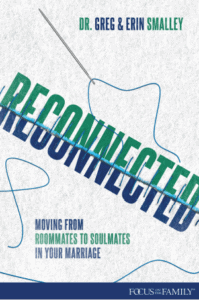Estimated reading time: 6 minutes
“Could you please bring home a few apples?” my new bride, Diane, asked.
I was headed to the store, and Diane made this simple request as I was leaving. “Sure,” I said. It felt good to help her out.
I like apples that are a little tart, so I purchased some small, green apples on sale. When I arrived at home and presented her with my gift, Diane said, “I wanted apples for eating, not for baking.” Her voice was tense, filled with frustration. “Just regular, red apples.”
I had expected her to be grateful for my effort, but she wasn’t — and I was angry. I thought, She didn’t tell me what kind of apples, and I gave her exactly what she asked for.
Table of Contents
- The Communication Tool Registry for Marriage
- 1. Use Focused Attention as a Communication Tool in Marriage
- 2. Communicate Clear Expectations
- 3. Ask Your Spouse Second Questions in Conversation
- 4. Wrangling Technology as a Marriage Skill
- 5. Streak-Connecting with Your Spouse
- 6. Use Your Communication Skills to Foster Wonder in Your Marriage
The Communication Tool Registry for Marriage
In the early days of our marriage, we realized that we each brought an individual view of life to the relationship and that neither of us was a mind reader. We had to learn ways to find out what the other was thinking.
Typical newlyweds are not fully equipped for marriage and need help from the community. For example, newlyweds usually don’t have furniture or cookware to set up a home, so wedding guests bring gifts to get them started.
In the same way, couples often don’t have a lot of communication tools when they enter marriage. When conversations get tough, they may need better tools than they have, but they don’t know where to find them.
What if a couple registered for communication tools instead of toasters or towels? Here are the six tools I’d want to see on their list:
1. Use Focused Attention as a Communication Tool in Marriage
While Diane and I were driving though central California during a cold winter day, we had to climb a winding mountain road in the fog.
I could barely see the white lines in front of the car as we crawled along, and my attention was laser-focused on my driving. But an hour later we came down the other side and into the bright, warm sunshine. I relaxed, and within minutes I was drowsy and inattentive.
That’s a recipe for disaster in both driving and marriage. Over time, we can become inattentive to our spouse’s needs. We can take our opportunities for communication for granted, as if we expect the road to always be smooth and straight. The solution? Becoming intentional about our connection:
- Make direct eye contact when talking.
- Press “pause” or “mute” on the remote when your spouse approaches. This habit will be a reminder of what’s more valuable. (Cellphone etiquette will be discussed later.)
- Initiate conversation about your spouse’s concerns instead of waiting for him or her to bring them up.
2. Communicate Clear Expectations
When I look at an issue through my own lenses, I assume that my spouse sees it the same way. That’s a common source of irritation and conflict because that assumption ignores her unique perspective.
In your marriage, develop the communication skill of clarifying meaning early in each conversation. Otherwise, you’ll wonder why your spouse brought home the wrong kind of apples. Ask questions like:
- “So you prefer a relaxing vacation. What does ‘relaxing’ look like to you?”
- “You’ll be gone for a while. Can you give me a rough time frame when you’ll be back?”
- “Sure, I have a minute. Or if we need longer than that, may we connect in a half hour instead?”

Reconnected
Learn to recognize how gentle neglect and silent routines are the “little foxes” and how you and your spouse can catch them before drifting apart.
3. Ask Your Spouse Second Questions in Conversation
During a conversation, it’s easy to be focused on forming your reply to your spouse rather than listening to seek understanding. Instead, develop a curiosity about what’s under the surface of your spouse’s statements, and the practice will bring you together.
If you respond with your thoughts first, it’s often an indication that you’re not focused on the other person. But if you simply listen and ask a second question to explore what your spouse has said, it demonstrates caring and builds trust. Just take what he or she has said to the next level:
- “So, what were you feeling when your boss took credit for your work?”
- “You said that was one of the best books you’ve ever read. What about the book affected you the most?”
- “That seminar sounds really interesting. What would you be looking to take from it?”
4. Wrangling Technology as a Marriage Skill
Technology can be a powerful tool for effective communication in marriage. But like any tool, it can be misused. Holding a conversation is tough when someone is distracted by a screen. So when your spouse is present, you need to turn your attention toward him or her. Try these ideas for taming your tech:
- When you go out to dinner, leave your cellphone in the car.
- When you’re apart, send several quick, fun text messages during the day to let your spouse know you’re thinking about him or her.
- Remove your television from your bedroom so it can be a retreat from tech.
5. Streak-Connecting with Your Spouse
A streak is something you do consistently over time. You pick something you want to do every day (exercising, flossing, etc.) and then put a big red X on the calendar every day it happens. Once you see the streak of X’s on the calendar, you won’t want to break it. Plan for streaks in your marriage and track them:
- Say “I love you” to your spouse every day.
- Make the bed every day.
- Pray with your spouse every day.
6. Use Your Communication Skills to Foster Wonder in Your Marriage
During courtship, all you can see is how amazing your partner is. After the wedding, you see things you didn’t notice before and think, Wait — I didn’t sign up for this.
Actually, we become more realistic as we learn more about the person we married. That’s healthy — unless we see only the negative and lose sight of the amazing. It’s still there, but we have to intentionally keep it on our radar:
- Write down one thing each evening about your spouse that you’re grateful for. Do it for a month, then show it to him or her.
- In conversations with friends, never describe your spouse’s faults. Share something specific about your spouse that amazes you (it’ll get back to your spouse).
- Reaffirm your relationship during conflict: “Right now, I feel really frustrated with you. That doesn’t change the fact that I adore you, and I’m not going anywhere. But I still feel frustrated …”
Communication is the foundation on which we build world-class relationships. The more valuable the relationship, the greater the need for effective communication. If the communication tools you have on hand aren’t working in your marriage, it’s time for better tools. Try some of these suggestions and watch your relationship grow!
Did you know couples are 30 percent less likely to get a divorce if they get some sort of premarital training? If you or someone you know is planning to marry, check out Focus on the Family’s Ready to Wed curriculum, and then prepare for a marriage you’ll love!
















